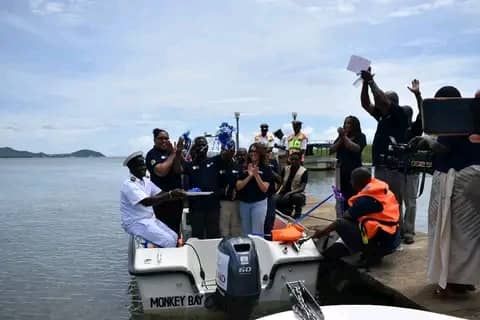By Twink Jones Gadama
In a groundbreaking effort to combat illegal fishing practices and promote sustainable fisheries management in Salima and Mangochi, the Restoring Fisheries for Sustainable Livelihoods in Malawi (REFRESH) project, funded by USAID, has recently confiscated over 1,500 illegal fishing gears in the region. This significant achievement signals a positive shift in the protection of aquatic ecosystems and the preservation of fish stocks for future generations.

The impact of illegal fishing cannot be overstated, as it directly contributes to the depletion of fish populations and undermines the livelihoods of local communities who rely on fishing as a primary source of income. The enforcement efforts of beach patrol officers in Salima and Mangochi have been crucial in cracking down on illegal fishing practices and safeguarding the health of Lake Malawi’s aquatic resources.
During a handover ceremony in Salima, where a patrol boat, new data collection system, and enforcement engines were formally presented, Principal Secretary in the Ministry of Natural Resources, Dr. Yusuf Mkungula, commended the collaborative efforts of the REFRESH project and local authorities in addressing the rampant issue of illegal fishing. Dr. Mkungula highlighted the tangible impact of these interventions, noting that the chambo species, a prized fish in Lake Malawi, has seen a 10 percent increase in population from a meager 3 percent over the past five years.
The REFRESH project, led by project specialist Bruce Sosola, has been at the forefront of promoting sustainable fisheries management practices and advocating for the adoption of innovative approaches to data collection and enforcement. Sosola emphasized the importance of transitioning from manual data collection methods to more advanced and efficient systems, highlighting the need for streamlined processes that can accurately monitor and assess the health of marine ecosystems.
The confiscation of illegal fishing gears is just one part of a larger strategy to promote sustainable fishing practices and empower local communities to become stewards of their natural resources. By curbing illegal fishing activities, the REFRESH project aims to create a more equitable and environmentally conscious fishing industry that benefits both fishermen and the ecosystem at large.
Local fisherfolk have expressed their support for the enforcement efforts of the REFRESH project, noting the positive impact on fish stocks and the overall health of Lake Malawi. With increased awareness and proactive measures in place, there is hope for a brighter future where sustainable fishing practices prevail, ensuring a thriving marine ecosystem for generations to come.
As the REFRESH project continues to make waves in Salima and Mangochi, its dedication to promoting sustainable fisheries management sets a powerful example for other regions facing similar challenges. Through collaborative partnerships and innovative solutions, the project serves as a beacon of hope for the preservation of Lake Malawi’s precious aquatic resources and the livelihoods of those who depend on them.


